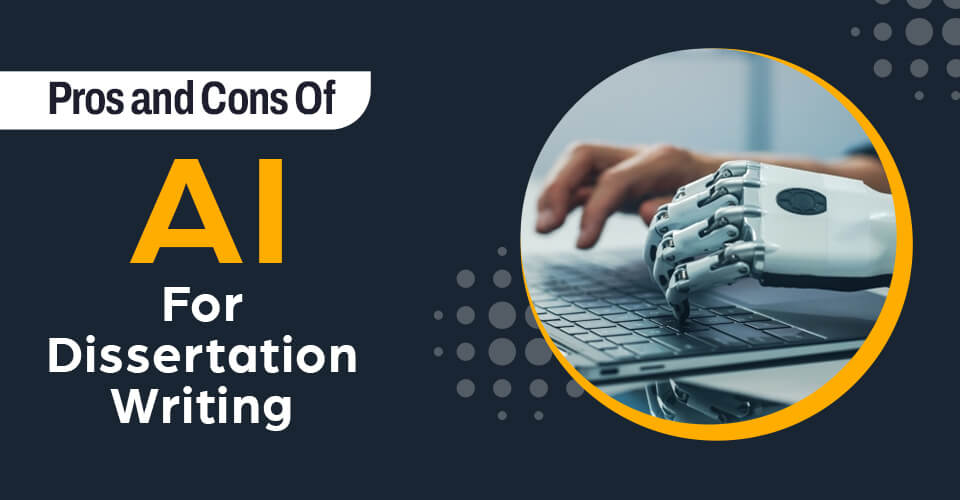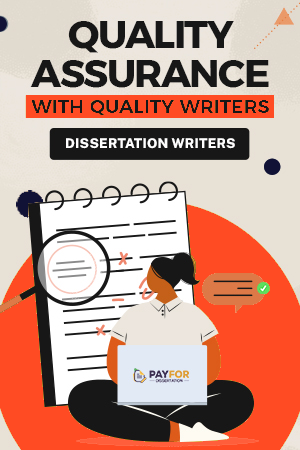
Pros and cons of AI for dissertation writing
The academic world has not been exempted from the upheaval brought about by artificial intelligence (AI) in other sectors. Recent years have seen the emergence of AI-powered technologies that can help students and researchers with many areas of the dissertation writing process. These innovations promise to simplify processes, increase effectiveness, and raise the standard of academic work as a whole. AI in dissertation writing does, however, have its own set of benefits and drawbacks, just like any other breakthrough. We shall examine the advantages and disadvantages of employing AI for dissertation writing in this blog, highlighting both its potential strengths and weaknesses. By being aware of these factors, researchers and students can decide how to use AI to their advantage while being aware of any potential negatives.
Ai dissertation generator Tools
AI tools have become increasingly popular and beneficial for researchers and students in the AI to write dissertations. These tools leverage artificial intelligence algorithms to assist with various aspects of academic writing, research, and organization. Some of the notable AI tools for dissertation writing include:
- Grammarly: A widely used AI-powered writing assistant that helps with grammar, spelling, punctuation, and style checks. It provides suggestions for improving sentence structure and readability, ensuring the dissertation's overall clarity and coherence.
- Turnitin: This plagiarism detection tool utilizes AI to analyze and compare written content against a vast database of academic materials, helping researchers ensure the originality and integrity of their work.
- Ref-N-Write: This AI-based tool assists in generating citations and references in various academic styles, saving time and ensuring accuracy in the dissertation's bibliography.
- Zotero: An AI-enabled reference management tool that helps researchers collect, organize, and cite sources from academic databases and websites, streamlining the research process.
- IBM Watson: Watson is a powerful AI platform that can analyze large datasets, extract insights, and provide valuable data analysis for researchers working with complex data.
- GrammarCheck: Similar to Grammarly, this tool uses AI to proofread and suggest improvements in grammar, sentence structure, and writing style.
- EndNote: An AI-powered reference management tool that helps researchers organize and cite sources in different citation styles.
- Scholarcy: This tool utilizes AI to summarize research papers and articles, helping researchers quickly identify relevant information for their literature review.
- PaperRater: An AI-driven proofreading and grammar checking tool that provides detailed feedback to enhance the quality of writing.
- WriQ: Designed specifically for students and educators, WriQ uses AI to evaluate writing and provides feedback on writing quality, fluency, and vocabulary.
While these AI for dissertation tools can significantly assist with various aspects of the dissertation writing process, it is essential to use them as aids and not rely solely on their suggestions. Human judgment and critical thinking remain crucial in conducting in-depth research and producing original and meaningful academic work. That’s why lots of students hire Write My Dissertation For Me Uk services instead of using AI generators to have a human touch on their dissertation.
AI dissertation generator for MBA & PhD
AI dissertation generators are software or tools that use artificial intelligence algorithms to automatically generate academic papers, including dissertations, for MBA and Ph.D. students. These tools use natural language processing and machine learning techniques to analyze existing research papers and generate new content based on the patterns and structures found in the data.
The idea behind ai for writing dissertation generators is to assist students in quickly producing drafts or outlines for their dissertations. However, it's important to note that the quality of the generated content may vary significantly, and these tools should not be seen as a substitute for proper research, critical thinking, and academic writing skills.
While AI dissertation generators may save time in generating initial drafts, they should be used with caution and only as a starting point. It is essential for students to conduct thorough research, analyze data, and develop original and well-structured arguments for their dissertations. Academic integrity and adherence to ethical standards in academic writing are crucial, and relying solely on AI-generated content may lead to plagiarism or inadequate academic work.
However, above mentioned list of AI generators can be used for MBA and Ph.D. both as well.
Pros of ai for dissertation writing
Using AI for dissertation writing offers several advantages that can significantly enhance the research process and improve the quality of the final document: ai tools for dissertation writing
Eliminates human error and risk
In several areas of dissertation writing, AI has the ability to Help With Mba Dissertations by drastically reducing human mistakes and minimizing risk. AI can manage arduous and repeated jobs through automation, ensuring data accuracy and lowering the possibility of mistakes brought on by human weariness or oversight. More accurately than people, AI systems can analyze massive amounts of data, spot patterns, and derive insights, reducing the possibility of mistakes in data interpretation and analysis. Grammar and spelling mistakes can be detected by AI-powered writing helpers, while plagiarism detection tools can guarantee that the text is unique.
Unbiased decision making
AI can improve unbiased decision-making by eliminating human bias and subjectivity. It processes data objectively, avoiding personal beliefs and prejudices. AI can identify patterns and trends in large datasets, providing a comprehensive and objective view. It can also follow strict guidelines, ensuring consistency in decision-making. However, AI systems are only as unbiased as the data and algorithms used to train them. Continuous monitoring and evaluation are essential to ensure fairness and address potential biases.
Data acquisition and analysis
AI tools for dissertation writing significantly improve data acquisition and analysis by collecting vast amounts of information from various sources, filtering and organizing it, and handling complex datasets. It excels at identifying patterns, correlations, and trends, enabling deeper insights and decision-making. Machine learning and advanced statistical analyses enhance accuracy and reliability, while AI can handle repetitive tasks without fatigue. AI also performs predictive modeling, providing valuable predictions and forecasts in fields like finance, healthcare, and marketing. Overall, AI streamlines the data acquisition and analysis process, allowing researchers to focus on interpreting results and making informed decisions based on AI-powered insights.
24/7 availability
AI's 24/7 availability revolutionizes industries by allowing users to work on tasks and projects anytime, without being limited by traditional office hours or time zones. This increased productivity and flexibility allow for efficient workload management. AI's ability to process vast amounts of data and perform complex tasks at high speeds ensures faster turnaround times, saving time and enabling timely responses. It also breaks down geographical barriers, enabling international collaborations and research, and ensuring continuity in operations even during unforeseen events. AI's constant accessibility leads to cost-effectiveness, enabling businesses to streamline operations and optimize efficiency. Overall, AI revolutionizes the way we work, making us more productive, responsive, and efficient, creating endless opportunities for growth and advancement in various fields.
Cons Of Ai for Dissertation Writing
While AI offers numerous benefits for dissertation writing, it is not without its drawbacks. Some of the cons of using AI for dissertation writing include:
Costly implementation
Implementing AI in dissertation writing is a costly endeavor due to the time, expertise, and resources required for development, training, and infrastructure management. AI systems require large datasets, high-quality data, and high-demand experts, leading to competitive salaries and recruitment challenges. To ensure sustainable implementation, educational institutions and researchers must assess costs, consider long-term benefits, and explore open-source AI tools. Collaborations within the research community and cost-benefit analysis can help mitigate financial challenges and maximize the potential of AI implementation in the academic domain.
Lack of emotion and creativity
AI in dissertation writing lacks emotion and creativity, as it processes data using algorithms and predefined rules. Phd Dissertation Assistance can infuse their work with passion, empathy, and personal experiences, making it more engaging and relatable. AI, on the other hand, operates based on data patterns and logical rules, leading to a mechanistic and detached writing style. Creativity is another vital aspect that AI struggles to replicate, as it may not generate original and creative insights. AI may not fully understand the broader context and nuances of research topics, affecting the quality and depth of dissertation writing. Balancing AI assistance and human input is essential to maintain a human touch, originality, and a compelling narrative that engages readers on a deeper level.
No improvement with experience
AI in dissertation writing faces limitations due to its inability to improve with experience. AI models are trained on vast datasets, but they lack the capacity for experiential learning. Human researchers and writers continually refine their skills and knowledge through their academic journey and exposure to research projects. This experiential learning enables them to produce more refined and insightful dissertations. AI, on the other hand, lacks the capacity to receive and incorporate feedback, limiting its ability to improve and refine its writing over time. The human touch and the potential for continuous improvement with experience remain critical factors in producing high-quality and insightful dissertations.
